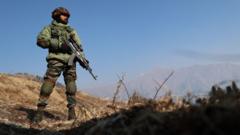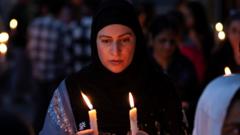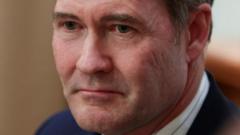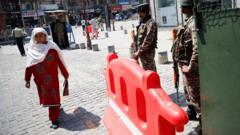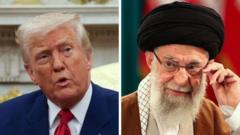In the wake of a deadly militant assault in Indian-administered Kashmir, which resulted in the deaths of 26 civilians, the United States has urgently requested that India and Pakistan work towards reducing escalating tensions. Secretary of State Marco Rubio held discussions with both India's Foreign Minister and Pakistan's Prime Minister, urging them to prioritize peace and security in South Asia.
US Calls for Restraint as Tensions Rise Over Kashmir Attack
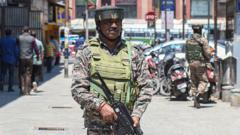
US Calls for Restraint as Tensions Rise Over Kashmir Attack
The US government emphasizes the need for India and Pakistan to de-escalate tensions following a tragic attack in Kashmir that left 26 civilians dead.
India has accused Pakistan of harboring militants responsible for the April 22 attack near the popular tourist location of Pahalgam, a claim that Pakistan has staunchly denied. In response to the attack, India took decisive measures, including the closure of its airspace to all Pakistani aircraft, showcasing the escalating tit-for-tat dynamics between the two nations.
During a phone call with Rubio, Indian Foreign Minister S Jaishankar demanded justice for the "perpetrators, backers, and planners" of the Pahalgam attack, while the US Secretary of State expressed his condolences and reaffirmed support for India's counter-terrorism efforts. On the other side, Pakistan's Prime Minister Shehbaz Sharif rejected the Indian claims linking his country to the incident and urged the US to encourage India to temper its rhetoric.
Speculation has grown over a potential military response from India, reminiscent of previous military actions taken after attacks in 2016 and 2019. Amid reports of credible intelligence about an impending Indian military strike, Indian leadership held urgent meetings, with Prime Minister Modi reportedly granting the armed forces full autonomy regarding their response strategy.
Over the last week, both countries have experienced aggravated border skirmishes, with India expressing its disapproval of multiple ceasefire violations by Pakistan. In retaliation to earlier measures, India suspended most visas for Pakistani citizens and halted a significant water-sharing agreement. Similar retaliatory actions followed, resulting in the departure of hundreds of nationals from both countries.
Additionally, social media restrictions have intensified, with Indian authorities blocking various Pakistani celebrities' Instagram accounts and banning Pakistani news channels for allegedly provocative content. As tensions continue, the situation in Kashmir remains precarious, with ongoing unrest fueled by decades of historical friction between the two nuclear-armed nations.
Kashmir, a disputed territory claimed in full by both nations yet administered in part, has been a contentious flashpoint since the 1947 partition. This recent attack, the worst violence against civilians in two decades, has heightened emotions across India, with Modi vowing substantial consequences for the attackers.
During a phone call with Rubio, Indian Foreign Minister S Jaishankar demanded justice for the "perpetrators, backers, and planners" of the Pahalgam attack, while the US Secretary of State expressed his condolences and reaffirmed support for India's counter-terrorism efforts. On the other side, Pakistan's Prime Minister Shehbaz Sharif rejected the Indian claims linking his country to the incident and urged the US to encourage India to temper its rhetoric.
Speculation has grown over a potential military response from India, reminiscent of previous military actions taken after attacks in 2016 and 2019. Amid reports of credible intelligence about an impending Indian military strike, Indian leadership held urgent meetings, with Prime Minister Modi reportedly granting the armed forces full autonomy regarding their response strategy.
Over the last week, both countries have experienced aggravated border skirmishes, with India expressing its disapproval of multiple ceasefire violations by Pakistan. In retaliation to earlier measures, India suspended most visas for Pakistani citizens and halted a significant water-sharing agreement. Similar retaliatory actions followed, resulting in the departure of hundreds of nationals from both countries.
Additionally, social media restrictions have intensified, with Indian authorities blocking various Pakistani celebrities' Instagram accounts and banning Pakistani news channels for allegedly provocative content. As tensions continue, the situation in Kashmir remains precarious, with ongoing unrest fueled by decades of historical friction between the two nuclear-armed nations.
Kashmir, a disputed territory claimed in full by both nations yet administered in part, has been a contentious flashpoint since the 1947 partition. This recent attack, the worst violence against civilians in two decades, has heightened emotions across India, with Modi vowing substantial consequences for the attackers.

